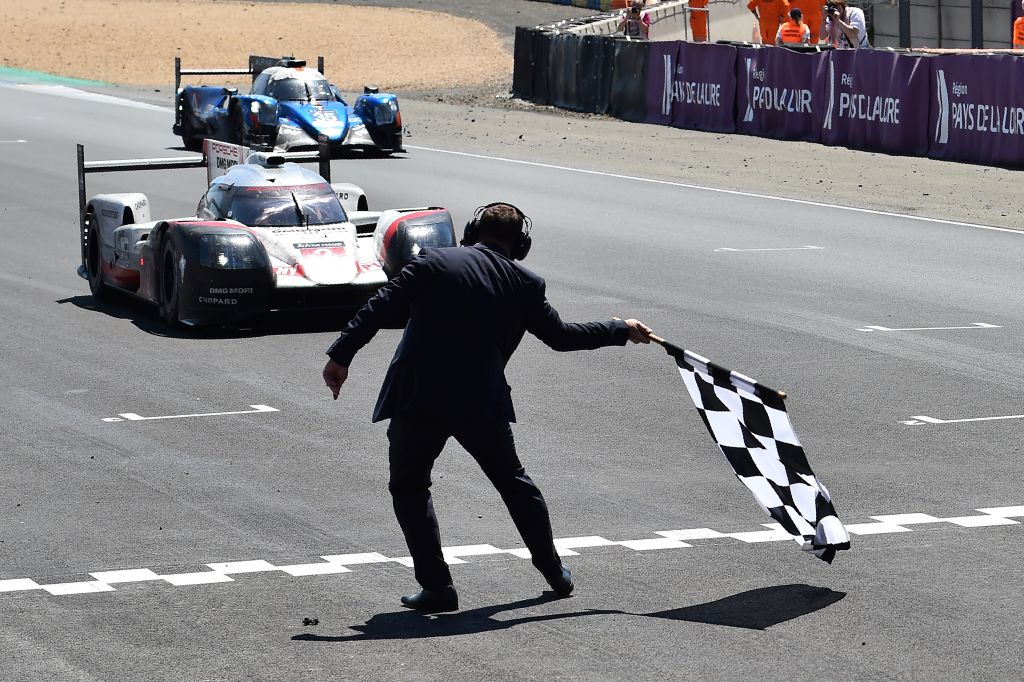

Oh, woe is the 24 Hours of Le Mans. Right? Is that what you’re saying, after the not-entirely-unexpected news that Porsche is dumping its LMP1 sports car program at the end of 2017 to go Formula E racing?
It is a blow to those sports car racing fans who thrive on the newest technology. But displaying the newest technology in a 24-hour race is difficult, to say the least: That’s why the ACO, the organizers of the Le Mans, are well aware they dodged a bullet at the 2017 race. In a bold, come-from-(way)-behind victory, one of the Porsche 919 Hybrids managed to triumph, ahead of the next six cars, which were all LMP2 entries. All of the other LMP1 cars fell by the wayside.
Had an LMP2 car won, you and I would have been fine. But the ACO and the World Endurance Championship, which sanctions the season-long series of races and just hates it when things don’t turn out like they were supposed to, would have been apoplectic.
Why? Because none of the LMP2 cars—which look so much like the much, much more expensive LMP1 cars that you have to pay close attention to tell them apart—are really affiliated with a deep-pocketed manufacturer.
So what? So this: Had Jackie Chan’s (stop giggling) DC Racing Oreca 07 won—and it almost did—who’s buying those big self-congratulatory ads in USA Today? Who’s touting the victory on their global website? What dealers might benefit from a Le Mans win, aside from a few Jackie Chan memorabilia merchants?
Nobody, since the car builder, Oreca, and the engine builder for all the LMP2 cars, Gibson, have nothing to sell to the public. Porsche does. Toyota does. Audi did, when they were king of LMP1 in the pre-Dieselgate days. Peugeot did, before the company finally balked at what it cost to compete in LMP1 (hundreds of millions of bucks). Only the winner gets to tout a Le Mans victory. If you are a hundredth of a second behind, you’re just the first loser, and good luck explaining to your board of directors that the $200 million they spent to race in LMP1 at Le Mans was a good investment.
So now, Porsche will soon be gone from LMP1. Audi is gone from LMP1. Peugeot is gone from LMP1.
Leaving Toyota. Does Toyota stick around, hoping to finally win Le Mans? Wouldn’t it be sort of a hollow victory if the company does win? And wouldn’t it be even worse if Toyota was beat, as they were this year, by six LMP2 cars? So what does the ACO do?
What they do is what they should have done in the first place. Dump the current LMP1 program, and its requirement that the companies participating essentially finance and engineer a brand-new space shuttle every year if they want a chance to win.
Call the LMP2 cars LMP1’s. Saying it makes it so. Approximately 99.99 percent of the people in the world won’t know the difference, and we’d submit that a crapload of actual racing fans won’t either.
Let manufacturers, like those in the IMSA WeatherTech SportsCar Championship compete. Mazda, Cadillac, Acura, and I’d submit two or three more companies, would love to be able to race at Le Mans in the same Prototype cars they can race now in the WeatherTech series.
The only real loser would be Gibson, as a manufacturer can justify running an Oreca or Ligier or Dallara chassis (and they do, but they couldn’t justify running a Gibson engine (Gibson Technology, formerly known as Zytek, is a small British company that just builds racing engines) and calling it a Mazda or a Cadillac or an Acura.
The ACO’s deal with Gibson is through 2020, so somebody needs to write them a check – although if a team is not affiliated with a manufacturer, they may well choose to stick with Gibson.
But to make the 24 Hours of Le Mans, and the WEC, attractive to fans, they have to make it attractive to manufacturers, who shoulder the burden of advertising the races as part of their own motorsports public relations campaigns, and pick up the tab for just showing up.
Porsche leaving the LMP1 class is sad: In its own press release, Porsche said that “with great regret,” it must “end its involvement in the LMP1 class of the FIA World Endurance Championship (WEC) at the end of the 2017 season.”
But it isn’t the end of the world, and it isn’t the end of the 24 Hours of Le Mans.